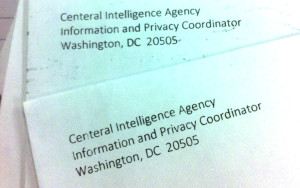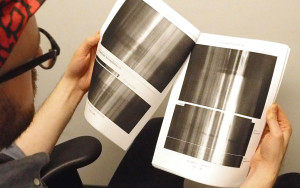
Last spring, Shoshana Walter with the Center for Investigative Reporting filed a routine public records request with the Sacramento County Sheriff’s Department for a story on a rogue firearms instructor. The request was unceremoniously denied, so Walter did exactly what reporters do in that situation: she pushed back. Moments later she received an email that she was never meant to see.
“Okay, now what? She is being a pain. Do we ask Peter what to do with her?” wrote the public servant handling the request.
The official immediately tried to recall the message. Within an hour, the Sheriff’s Department had a sudden change of heart and agreed to release the information. Meanwhile, all Walter could do was commiserate with other transparency advocates on the #FOIAFriday thread on Twitter.
Scroll through #FOIAFriday tweets, and you’ll find that Walter’s story is far from uncommon. In fact, the only thing unique is that, for once, Walter caught a glimpse of the cavalier attitude many government agencies take toward transparency.
March 13-19 is Sunshine Week, the season in which open government activists around the country make as much noise as possible about the need to reform laws on access to information, whether that’s the federal Freedom of Information Act (FOIA) or state-level laws, such as California’s Public Records Act (CPRA), New York’s Freedom of Information Law (FOIL) and Colorado’s Open Records Act (CORA).
Journalists, government watchdogs and regular citizens around the country encounter weak excuses, flagrant stonewalling and retaliation from government officials on a daily basis. That’s why, to celebrate Sunshine Week, the Electronic Frontier Foundation (EFF) created “The Foilies,” our name-and-shame awards for agencies and officials who stand in the way of transparency and accountability.
Join us on this journey as we examine some of the most ridiculous experiences members of the public have faced while pursuing James Madison’s 1822 advice: “Knowledge will forever govern ignorance; and a people who mean to be their own governors must arm themselves with the power which knowledge gives.”
The Self-Server Award: Former Secretary of State Hillary Clinton

The homebrewed email server former Secretary of State Hillary Clinton used during her time in office was lighter on complying with the spirit of FOIA than that watered-down lager brewed in your cousin’s closet. And just like your cousin deciding which buddies get to share in the homemade suds, Clinton herself decided which of her emails to share with the public and then deleted 30,000 of them.
Transparency advocates and journalists are right to criticize Clinton for using an insecure private email server, but it is important to remember that her story is merely the highest profile example of a public official misusing technology to stifle public oversight. For years, officials at the local, state and federal levels have been using private communications to shield their work from public scrutiny — New York Gov. Andrew Cuomo has communicated exclusively with Blackberry PIN messaging to avoid creating any records and high-level White House officials used their private email to conduct government business. There are, sadly, dozens of other instances of governors, city council members and county commissioners doing the same thing.
When officials use private communications for work, they are not just potentially violating open records laws, they are stymieing the public’s ability to understand operation of their elected government and to hold those officials accountable for their actions. Clinton deserves this award, but so does every official who seeks to hide his or her actions from the public by using private communications systems.
The “Old School” Award: Rowan County Clerk Kim Davis

Kim Davis, the Rowan County Clerk in Kentucky, ignited a national controversy last year when she was jailed for refusing to issue marriage licenses to same-sex couples. MuckRock News’ Shawn Musgrave filed two requests for emails from that period, including emails covering the time when she supposedly scheduled a meeting with Pope Francis.
It turned out that marriage wasn’t the only issue where Davis took a “traditional position.” Rather than provide the 6,000 or so communications to MuckRock in a digital format, she insisted she was “old school on this email stuff,” and instead asked for $1,200 for print-outs, despite the Kentucky Open Records Act requirement that electronic records be available in an electronic format. After a lengthy back-and-forth, Davis finally complied with the law and began forwarding the records.
Worst Definition of Terrorism: State of Georgia

Transparency advocate Carl Malamud’s Public.Resource.Org has been on a quest to make sure people have access to the laws that govern them. A righteous and benign endeavor, right? Well, not according to the state of Georgia, which is suing the organization for publishing a searchable and downloadable scan of the Official Code of Georgia Annotated. Georgia claims to hold the copyright to the laws, and by publishing them, Public.Resource.Org is not only engaged in piracy, but employing “a strategy of terrorism.”
Just to be clear: Reading a state’s annotated statutes might bore some people to death, but publishing the laws of the land has never killed anyone.
Full disclosure: EFF represents Malamud and Public.Resource.Org in similar lawsuits around the country, but not the Georgia case.
Most Expensive FOIA Fee Estimate: Department of Defense

Last year we issued this award to the Drug Enforcement Administration (DEA) for asking for $1.46 million in fees to process a FOIA request related to the capture of Mexican drug lord Joaquin “El Chapo” Guzman (and that’s even before he escaped, was interviewed by Sean Penn and then recaptured).
This year, the Pentagon makes the DEA’s assessment look like pocket change. When MuckRock user Martin Peck asked for the number of “HotPlug” devices (a tool used to preserve data on seized computers), the agency came back with a whopping $660 million fee estimate to “perform the necessary redactions of proprietary data.”
The Secretary of Defense claimed it has no way to do a text search of its document system, so it would take 15 million labor hours to do the search and redact the documents.
By MuckRock’s calculations: “15 million labor hours breaks down into 625,000 days, or a little over 1,712 years. So assuming one DOD employee started working on this nonstop tomorrow, they’d finish somewhere in the summer of 3728.”
Special Prize for Drunk Dialing for Public Records: New Mexico Governor Susana Martinez

New Mexico media outlets have been battling against Gov. Susana Martinez’s stalling tactics with records requests basically since she was elected to office in 2010. Yet, when it comes to her own requests for public information, Martinez is a little impatient.
Last year, Martinez was partying in a room at a downtown Santa Fe hotel when the police responded to complaints of noise and bottles being tossed off the balcony. While still at the hotel, a furious Martinez called 9-1-1 and demanded to know the name of the person who filed the complaint. As the released dispatcher recording revealed, Martinez demanded: “It’s a public record — give it to me.”
We’re a little sympathetic: the world would be a better place if we could all get public records on demand with a simple phone call. Unfortunately, that’s not the case yet, apparently not even for governors.
Martinez claims she’d only had one cocktail, but witnesses told police she was visibly “inebriated.” She later claimed, “nothing that I said or did was as a result of any alcohol.” That’s almost worse, isn’t it?
Ministry of Silly Talks Award: UK Independent Commission on Freedom of Information

The United Kingdom also has a Freedom of Information Act, and last year a new body was formed to review the state of play (read: investigate whether transparency is too expensive and invasive). But at its first meeting in 2015, the Independent Commission on Freedom of Information announced a ludicrously ironic set of ground rules for reporters. As The Guardian reported, the meeting would be “off-the-record” and journalists could not quote anyone. Transcripts weren’t published either.
Head Trip Award: U.S. Army Surgeon General

The U.S. Army wasn’t happy with New York Times reporter Dave Philipps’ investigation into concussions at West Point. As documents show, Army officials came up with a plan to undercut his story by stalling the release of FOIA documents until they could publish their own report. What’s worse is that this wasn’t the first time they’d pulled this trick. As Army surgeon general Lt. Gen. Patricia D. Horoho said, according to a meeting summary, “Timing is everything with this stuff. We were able to do something similar … when the Colorado Springs Gazette attacked them with treatment of wounded warriors last year — killed any scrutiny from the media and killed their story.”
Copywrong Award: City of Inglewood

Local governments hate gadflies, those tenacious citizens who troll public meetings at every opportunity. The city of Inglewood in California thought it would use copyright law as a swatter, suing local resident Joseph Teixeira. Teixeira had been posting video clips from city council meetings (which are public records) to YouTube with his own DVD-bonus-feature-style commentary, accusing officials of lying and betraying their constituents. Teixeira won the case in federal court in August, proving that trying to use copyright law to silence critics is a waste of everyone’s time and tax dollars.
Gitmo, Get Less Award: Department of Defense

Miami Herald reporter Carol Rosenberg has been covering Guantanamo Bay for more than a decade, and that’s how long its taken the Department of Defense to release information on the costs of running the offshore detention facility for enemy combatants in the “War on Terror.” In 2004, a DOD official started compiling answers to her questions, but later informed her he was under orders not to release the information. So, Rosenberg filed a formal FOIA request in February 2005, received a rejection and then appealed. In 2015, almost 4,000 days later, she received an apology for the delay and a decision that the secrecy was unwarranted. She received three pages of information that showed the tens of millions spent to maintain the controversial facility in its first years.
Correction Fluid Award: Willacy County Sheriff, Texas

The Houston Chronicle was researching a reported spike in crime along the Mexican border by filing Open Records Act requests for crime data with sheriffs across south Texas. None of the sheriffs asked the Chronicle to pay records fees, except for one: the Willacy County Sheriff provided Brian M. Rosenthal with an itemized invoice for $339.60 that included — wait for it — $98.40 worth of Wite-Out. Based on Staples pricing, that’s a full 55 bottles worth of redaction or one bottle of Wite-Out per 18 pages of responsive documents.
Spellcheck Shmellcheck Award: Central Intelligence Agency

These FOIA response envelopes received by MuckRock (mis)speak for themselves.
Beasts of Privacy Award: Oregon State Legislature
This year, we received three separate nominations in which FOIA officials were absurdly mindful of the privacy of animals. Reporter Elizabeth Dinan found on at least two occasions that the Portsmouth Police Department in New Hampshire were redacting the names of lost and loose dogs from its blotters. Meanwhile, MuckRock contributor Carly Sitrin found that New Jersey initially refused to release the necropsy results for a dolphin that died in the South River, citing the dolphin’s “medical privacy.” N.J. later reversed course.
The prize, though, goes to the Oregon State Legislature, which renewed a law exempting the names of people who sell laboratory animals to Oregon Health & Sciences University, ostensibly to protect vendors from overzealous animal rights activists. InvestigateWest reporter Lee Van Der Voo obtained records (released seemingly by accident by the Oregon Department of Agriculture) that illustrated the pitfalls of shielding an industry from scrutiny. As it turns out, one of the primary primate dealers to the University had previously served time for illegally smuggling orangutans as part of the infamous “Bangkok Six” case.
Sue the Messenger Award: Sacramento Mayor Kevin Johnson

The Sacramento News & Review filed a public records request with the city of Sacramento for communications from Mayor Kevin Johnson’s office regarding how the former basketball star and his staff allegedly engineered the collapse of the National Conference of Black Mayors. The City Attorney agreed the emails were public, but then Johnson’s legal team threatened to file a lawsuit against SNR unless they abandoned their quest for transparency. SNR refused, Johnson sued and now the story has been stalled as the case plays out through a protracted legal process. It remains to be seen whether the case will wrap up before Johnson leaves office next year.
The Culture of Secrecy Award: Kentucky Cabinet for Health and Family Services

Back in 2010 and 2011, the Courier-Journal and the Lexington Herald-Leader filed Open Records Act requests with the Kentucky Cabinet for Health and Family Services for information related to child fatalities. The agency balked at providing many of the records, forcing the newspapers to sue.
A lower level court ruled in the newspapers’ favor and ordered the agency to pay $1 million in penalties and fees. Rather than let it go at that, the cabinet appealed, only to dig itself deeper into the hole. After the oral argument in October 2015, the appeals court sided with the media and issued this juicy condemnation:
“The Cabinet’s conduct in this case was indeed egregious. The face of the record reveals the ‘culture of secrecy’ of which the trial court spoke; and it evinces an obvious and misguided belief that the Open Records Act is merely an ideal — a suggestion to be taken when it is convenient and flagrantly disregarded when it is not.”
The Most “Helpful” Redactions Award: Office of Director of National Intelligence

Redactions are a way of life in FOIA, but a response the American Civil Liberties Union (ACLU) received from the Office of the Director of National Intelligence (ODNI) in September takes this year’s award for most ridiculous misuse of the black marks.
For years, the ACLU has been demanding access to records documenting the government’s “targeted killing” program. In ODNI’s response to ACLU, it claimed to be releasing an eight-page letter the ODNI Director James Clapper sent to ranking senators on the Intelligence Committee. That statement was belied by the fact that ODNI withheld nearly every word of the letter, save for the page numbers, names and addresses of the senators it was sent to and a final concluding paragraph from Clapper. The redactions are so all-encompassing, there is no way to know what the subject of the letter is and whether it actually discusses the targeted killing program.
The kicker? The unredacted paragraph at the end of the letter begins “We hope this information has been helpful.”
Yeah, real helpful. Keep up the FOIA trolling, ODNI.
Exhibit Inhibition Award: Department of Justice

The Department of Justice (DOJ) believes that exhibits it used in open court when prosecuting a doctor convicted of illegally distributing prescription drugs are not, in fact, public records. The DOJ staked out this curious position in a long-running FOIA dispute with Rhode Island-based reporter Phil Eil after he filed a request for copies of the exhibits prosecutors used during the 2011 trial of the doctor, Paul Volkman. After stalling for several years and requiring Eil to sue for the records, the DOJ proposed to release the records in heavily redacted form.
Of course, anyone who attended the trial would have been able to see the records without the DOJ’s redactions, which the DOJ claims are in part necessary to protect law enforcement concerns, despite airing those records in open court.
The Still-Interested Pat Down Award: Transportation Security Administration

Like the airport security line on a busy travel day, the TSA’s backlog of FOIA responses just seems to keep growing. That’s according to a compliance review by the Office of Government Information Services (OGIS), one in a series of reports on various agency-components of the Department of Homeland Security (DHS). OGIS found a nearly 70 percent year-over-year rise in the backlog of unfilled request — up to 924 in 2014 — despite a small drop in the number of incoming requests.
How does TSA get through those old requests? Unfortunately, it turned to the dreaded “still-interested letter,” checking to see if requesters still care enough to want an answer. TSA sends those out after a case has gone unclosed for four years — and, contrary to DOJ guidance, allows only 10 days for requesters to respond.
A bright spot in this sad story: since OGIS compiled its report, TSA has updated its procedures on still-interested letters to bring them into line with DOJ and the rest of DHS.
The Timey-Wimey Award: City of Wilmington, Delaware

In October, Wilmington Mayor Dennis Williams had to clarify he had not endorsed Secretary Hillary Clinton for president after the campaign had listed his name on her website. The next day, America Rising, a conservative opposition research organization, filed a records request that asked for all communications to and from the mayor’s public relations team for that single, tumultuous day.
Here’s where the timeline gets bizarre: America Rising filed the request on October 21, asking for communications that were exchanged on October 20. Instead, the city said that America Rising had demanded the request be fulfilled by October 20, one day before the request was actually filed. The city denied the request, essentially claiming they lacked the time travel capabilities to respond.
Since then, America Rising has clarified its request twice, and it’s still pending.
The Electronic Frontier Foundation is a non-profit organization that defends free speech, privacy, innovation, and transparency in the digital world. The Foilies were compiled by Dave Maass, Aaron Mackey and Parker Higgins of EFF, with assistance from Michael Morisy and JPat Brown of MuckRock News.














